Whoa! Go! Weeds vs. Volunteers
Weeds vs. volunteers. Every gardener knows the one word definition of each: weed=unwanted, volunteer=dandy! While it’s true that volunteers occasionally get out of control and drift into the “unwanted” zone, they’re generally easy to remove and back off gracefully.
So, herewith a sampling of both categories of plants observed in my garden during the past week.

Bindweed: In areas where it’s taken hold, almost impossible to get rid of, very vigorous growth, and capable of strangling a Russian soldier in full winter gear. Convolvulus arvenis.
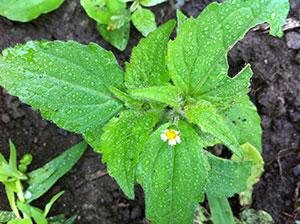
Galinsoga: A South American invasive that colonized (also known as “gallant solider”) my garden about 25 years ago, loves cultivated ground, makes me crazy. G. quadriradiata.

Cheeses: This one is sneaky ’cause it’s got a nice flower–its other name is “common mallow”–but don’t let it seduce you. Malva neglecta.
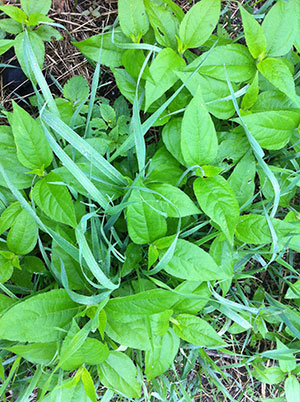
Quack grass and Jerusalem artichoke: Okay, no explanation needed about quack grass. Jerusalem artichoke should NOT be planted in or near your garden, even if you love it as a vegetable. It’s far too aggressive. Helianthus tuberosus.
klkjl;
On to the favored volunteers…
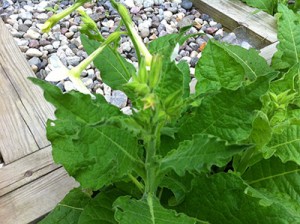
Nicotiana: large plant, white flowers, very fragrant at dusk, easy to pull out when unwanted. N. alata.
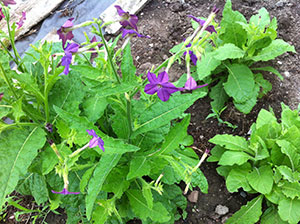
Nicotiana: purple/pink. I think the white nicotiana is more fragrant. Both close relatives of tobacco.
N. alata.
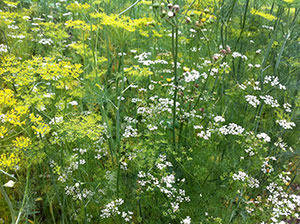
Dill and Coriander/Cilantro: welcome herbal volunteers, re-seed more than once a season. Anethum graveoleous, Coriandrum sativum.
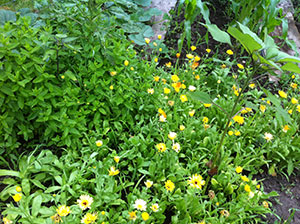
Spearmint and Calendula (plus a few volunteer sunflowers): The mints spread readily, so beware. Once you plant calendula, you’ll never have to plant again. An annual that successfully self seeds. Mentha spicata, Calendula arvensis.
df
And, then, there’s zucchini! Which doesn’t volunteer, but can take over our lives, eh? This is a photo of zucchini in my garden taken earlier this week. We’ve been eating baby zucchini in salads and stir fries.
What are you ripping gleefully from your garden…or nurturing like a mother hen? I have some photos from other gardeners I’ll be sharing here in a few days. Email your garden photos–of good or bad–to [email protected]
Tags: agriculture, gardening, vegetables, weeds





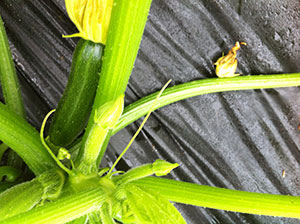



Here in Potsdam Village, we had a bumper crop of Butternuts last year, and the squirrels planted them all in my garden. We’ve pulled probably 500. We got an unfamiliar and nasty thistle with some topsoil last year, and are working to get every last one out of the yard. Even if we’re successful, one has to wonder how many more seeds will sprout, and for how many more years.
Tootight…Thistles can be really persistent. We’ve been fighting them in one of our sheep pastures for several years. And, I’ve come to the conclusion that road crews spread weed seeds when then mow the shoulders. Periodically some new weed shows up all along the shoulders where before the plant had never been seen. Two relatively recent examples: Asian mustard and water hemlock.
So true about Jerusalem Artichoke. I planted a few a couple of years ago and they definitely take over…I learned A. that they are not from Jerusalem, B. They are not artichokes and C. that they grow to be 16 feet tall!!! Love to roast them with other veggies, though. This year we’ll have be be just as aggressive in the harvesting as they are in the growing!!!
Jerusalem artichokes…properly surrounded by lawnmowers…can make a fine privacy screen between you and that annoying neighbor.
Anybody got opinions on borage?
I planted it for the first time last year: sprawling plant with a very pretty flower. Bees love it.
This year I planted none – and have plenty! Obviously it is an exceptional self-seeder, which prompts some concern.
Should I rip it all out now, while I still can? (It is easily pulled)
Or will it I live to regret introducing it?
Hey, Lucy. I’ve grown borage without any “bad” outcomes. Yes, the plant is big, bold and easily self-seeds. But, if you control it by pulling out self-sown plants you don’t want, you shouldn’t have a problem. Some years the self-seeding shows up from the previous year’s planting, some years not.
Thanks Ellen!
That’s good to know because I think the flower is lovely (Wonderful shade of blue and it just keeps blooming.)
As I said, the bees like it too. I figure bees need all the help they can get these days.
Good NYT article on the amazing adaptability of weeds. (Or devilish persistance – take your pick!)